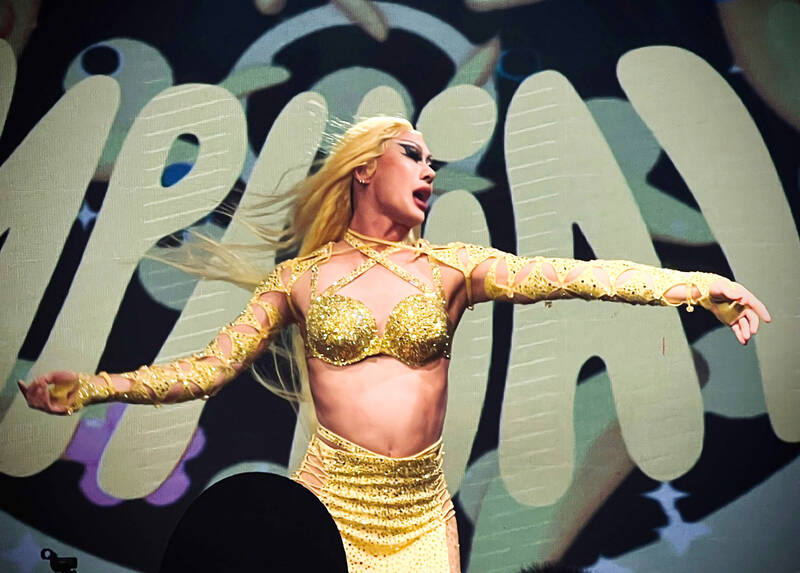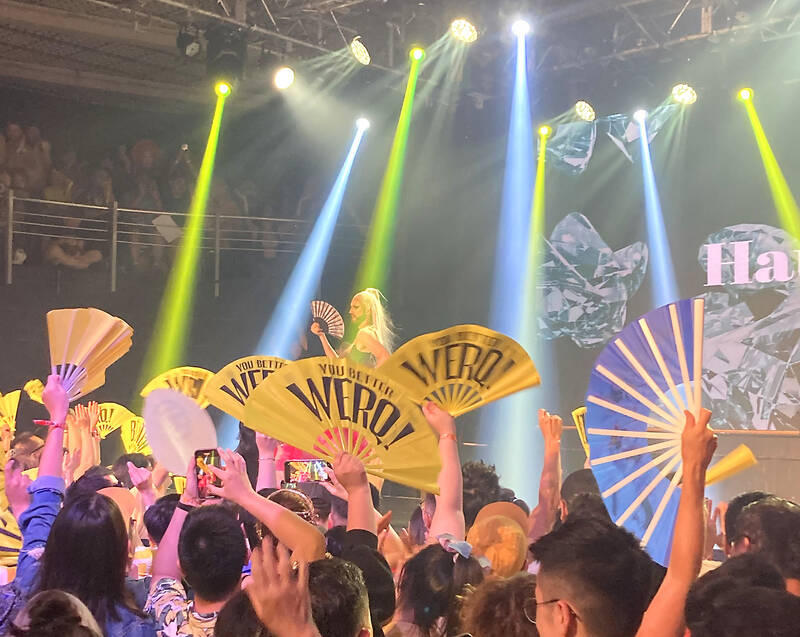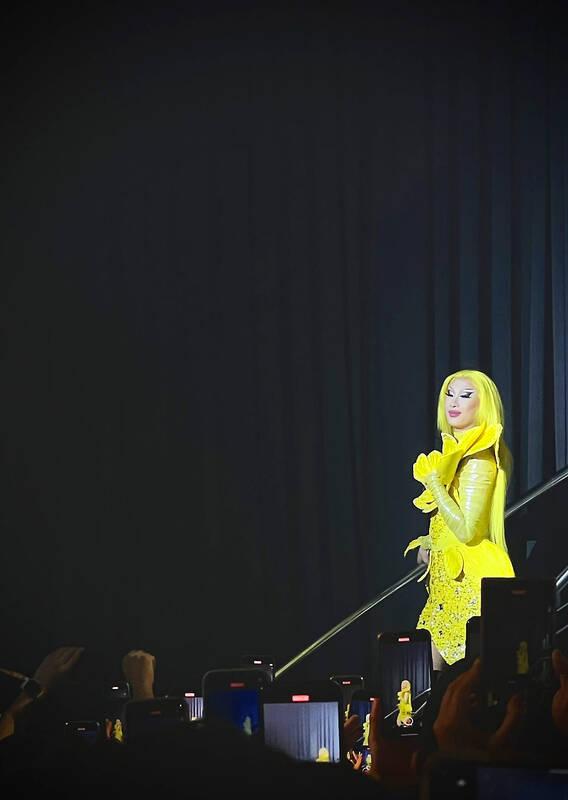The next act needs no introduction: an endless sea of anticipating drag fanatics dressed in yellow banana motifs have waited months for this moment. Crowded shoulder to shoulder, clacking our neon yellow fans emblazoned U Better Werq, cheering our voices hoarse, collectively we scream: Nymphia! Wind!
The spotlight pans to the spiral staircase left of stage, and atop stands Nymphia — the drag persona of Leo Tsao (曹米駬), who goes by he/him in everyday life, but she/her when in drag — in all her yellow glory: sparkling banana-yellow dress, trademark pin-straight canary wig and exaggerated winged-out eyeliner.
The electric guitar shrieks the intro to You and I by Lady Gaga, and she descends to her adoring audience, throwing her arms wide and lip-syncing the opening lyrics: “It’s been a long time since I came around, been a long time but I’m back in town.”

Photo: Hollie Younger
NYMPHIA NAILS IT
And back she is. Since taking the crown as America’s Next Drag Superstar on season 16 of US smash-hit reality-TV competition Ru Paul’s Drag Race back in April, tonight is Nymphia’s first public performance in Taiwan.
Tonight’s dress code: yellow. Her signature color serves as a celebration of Asian identity, and a symbol of joy, with her trademark Taiwanese yellow water lily a powerful metaphor for rising to greatness despite humble beginnings, and her beloved banana motif a metaphor requiring less explanation.

Photo: Hollie Younger
Taipei International Drag Fest Vol.2 is Taiwan’s biggest drag event of the year — over 1,500 tickets sold out within minutes. With both a matinee and evening show at venue Hanaspace (花漾展演空間), this is Nymphia’s heartfelt homage to her supporters, the “Banana Believers.”
Tonight, everyone around the venue it seems is wearing yellow. Drag queens clomp around 7-11 in lace-up stilettos. Queer kids in stage makeup queue for cans of Taiwan Beer. All a far cry from Nymphia’s new home stateside, where drag performers are still fighting for acceptance.
With more than 50 drag performers, this showcase of international drag excellence is a gathering of Nymphia’s friends old and new, from home and away.

Photo: Hollie Younger
Nymphia’s season 16 co-stars Plane Jane and Mirage also joined the lineup. Performing her iconically camp hit from the TV show, Burger Finger, Boston’s Plane Jane licks her finger seductively, whipping her platinum blonde wig, then eats a burger on stage and invites us to smell her burger finger.
Familiar faces from Taiwan’s drag scene also grace the stage. Standout troupe Haus of Dimensions’ Taipei Popcorn gives us an enrapturing performance as an enchanting and confusingly sexy seven-foot-tall Voldemort in ghoulish black lace.
Between acts, the crowd drools over Magic Mike-style male stripper troupe Haus of Booty Call, grinding provocatively and stuffing NT$1,000 bills into hot pink speedos.

Photo: Hollie Younger
Nymphia’s next number, I’m Alive by Sia, sees her screeching the powerhouse hit, before running and jumping to hang monkey-bars style from the staircase, swinging like a chandelier and pulling comically contorted facial expressions.
Mid-performance, she freefalls backwards into the awaiting arms of fans, surging to carry her overhead. Her star power is undeniable. In the words of Ru Paul, the audience is “gooped and gagged” (translation: stunned).
Nymphia’s often garners inspiration from East Asian culture, Taiwan’s temples and, of course, bubble tea.
For the fierce finale, she brings the house down as hundreds of black balloons descend on the arena — a callback to her final lip-sync on Ru Paul’s Drag Race, when she stunned the judges with black boba balloons bursting from a bubble-tea-decorated cloak.
When the three-hour extravaganza comes to a close, I am left voice cracked and legs shaking violently from straining on tiptoes — anyone would think I had been the one in 6-inch stiletto boots backflipping down the stage.
REPRESENTATION
As the first Taiwanese contestant on Ru Paul’s Drag Race and the first East Asian winner, Nymphia is not just using her platform, she’s building a stage to showcase Taiwan, celebrate her roots and bring with her the queens that raised her.
Nymphia has been busy since her return. From promoting the Taipei drag scene she called home for five years, to addressing protestors outside the legislative Yuan, to dazzling former president Tsai Ing-wen (蔡英文) with the world’s first drag performance in a Presidential Office — picture a bedazzled drag queen in a unitard cartwheeling into the splits, stilettoed legs spread wide before the bust of Republic of China (ROC) founding father Sun Yat Sen (孫逸仙) and a confused yet delighted Tsai.
Nymphia went on to personally thank the president for opportunities her administration had afforded to LGBTQ+ performers in Taiwan.
Tonight feels like just the beginning and there seems to be no stopping Nymphia on her conquest put Taiwan and Taiwanese drag on the map, showing the world our beautiful island’s boundless charisma, uniqueness, nerve and talent.

The unexpected collapse of the recall campaigns is being viewed through many lenses, most of them skewed and self-absorbed. The international media unsurprisingly focuses on what they perceive as the message that Taiwanese voters were sending in the failure of the mass recall, especially to China, the US and to friendly Western nations. This made some sense prior to early last month. One of the main arguments used by recall campaigners for recalling Chinese Nationalist Party (KMT) lawmakers was that they were too pro-China, and by extension not to be trusted with defending the nation. Also by extension, that argument could be

Aug. 4 to Aug. 10 When Coca-Cola finally pushed its way into Taiwan’s market in 1968, it allegedly vowed to wipe out its major domestic rival Hey Song within five years. But Hey Song, which began as a manual operation in a family cow shed in 1925, had proven its resilience, surviving numerous setbacks — including the loss of autonomy and nearly all its assets due to the Japanese colonial government’s wartime economic policy. By the 1960s, Hey Song had risen to the top of Taiwan’s beverage industry. This success was driven not only by president Chang Wen-chi’s

Last week, on the heels of the recall election that turned out so badly for Taiwan, came the news that US President Donald Trump had blocked the transit of President William Lai (賴清德) through the US on his way to Latin America. A few days later the international media reported that in June a scheduled visit by Minister of National Defense Wellington Koo (顧立雄) for high level meetings was canceled by the US after China’s President Xi Jinping (習近平) asked Trump to curb US engagement with Taiwan during a June phone call. The cancellation of Lai’s transit was a gaudy

The centuries-old fiery Chinese spirit baijiu (白酒), long associated with business dinners, is being reshaped to appeal to younger generations as its makers adapt to changing times. Mostly distilled from sorghum, the clear but pungent liquor contains as much as 60 percent alcohol. It’s the usual choice for toasts of gan bei (乾杯), the Chinese expression for bottoms up, and raucous drinking games. “If you like to drink spirits and you’ve never had baijiu, it’s kind of like eating noodles but you’ve never had spaghetti,” said Jim Boyce, a Canadian writer and wine expert who founded World Baijiu Day a decade